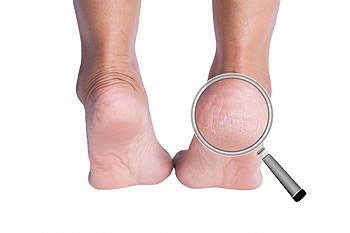
Heel fissures are cracks or breaks in the skin of the heels and usually form from intense dryness and thickened skin. These cracks can be superficial or deep, and they may bleed or feel painful. Heel fissures may worsen and become infected or turn into skin ulcers, and it is important to treat them to prevent this from happening. There may be underlying conditions that can lead to heel fissures, which can include, but are not limited to, nutritional deficiencies that can cause the skin to lose moisture, and skin ailments that result in inflammation, itching and dryness. Additionally, cracked heels may happen as a result of wearing footwear that does not allow the feet to breathe. People who have diabetes are at risk for nerve damage to the feet, which is referred to as peripheral neuropathy. One of the several problems this can create can affect the nerves on the feet. Sweating may be reduced or stopped, possibly causing a dry environment for skin fissures to develop. If you are experiencing heel fissures, it is strongly suggested that you seek the care of a podiatrist who can determine what the cause is, and offer correct treatment methods.
If the skin on your feet starts to crack, you may want to see a podiatrist to find treatment. If you have any concerns, contact our podiatrists from Superior Foot & Ankle Center. Our doctors can provide the care you need to keep you pain-free and on your feet.
Cracked Heels
It is important to moisturize your cracked heels in order to prevent pain, bleeding, and infection. The reason cracked heels form is because the skin on the foot is too dry to support the immense pressure placed on them. When the foot expands, the dry skin on the foot begins to split.
Ways to Help Heal Them
- Invest in a good foot cream
- Try Using Petroleum Jelly
- Ease up on Soaps
- Drink Plenty of Water
Ways to Prevent Cracked Heels
- Moisturize After Showering
- Skip a Shower
- Keep Shower Water Lukewarm
- Don’t Scrub Your Feet
If you are unsure how to proceed in treating cracked heels, seek guidance from a podiatrist. Your doctor will help you with any questions or information you may need.
If you have any questions, please feel free to contact our office located in Long Beach, CA . We offer the newest diagnostic and treatment technologies for all your foot care needs.
